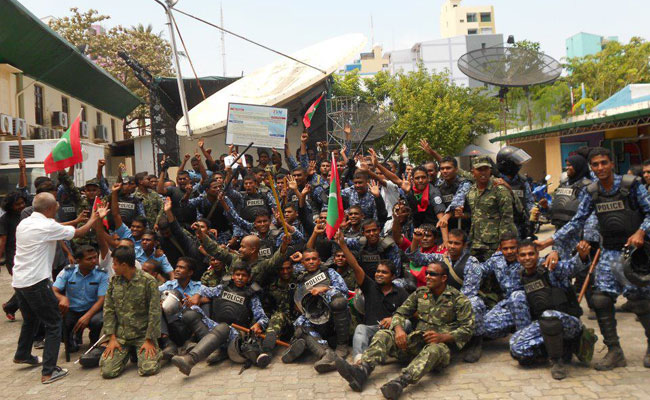As tear gas rained down on citizens marching in favor of ousted president Mohamed Nasheed’s government a day after what has been called a coup d’etat, hundreds of Maldivian metal fans attended a live concert by Swedish heavy metal Opeth at the Dhaarubaruge concert hall in Male’.
Nasheed, the Maldives first democratically elected president, resigned on Tuesday, February 7 following street clashes between national police and military forces. He has since stated that he resigned to protect the Maldivian people from further bloodshed.
Opeth, supported by home-grown Maldivian band Nothnegal, played a sell-out gig to eager crowds on Wednesday, February 8 – in spite of the chaos developing across the urban island.
Organisers said the political and civil unrest which has rocked the paradisaical archipelago for the past two days had forced them to postpone the concert, originally scheduled for February 7, by one day. It also made it impossible to hold the gig outdoors, they said.
Yet the band could not be cancelled, nor their fans deterred – offering a surreal insight into the Maldivian psyche. Much like the Lebanese who continued to celebrate as bombs rained down on Beirut, heavy metal fans refused to cancel the show as government hospital IGMH declared a state of emergency.
Rather, Maldivians embraced the chance to take a break from the situation and enjoy the show.
Nothnegal’s lead guitarist and Maldivian national Hirlal Argil reflected on the situation. “There still is hope for democracy, if only everybody would start working together to resolve all that’s happened rather than fighting for power,” he said.
“We Maldivian youth love heavy metal. I am not sure why but perhaps it is our rebellious spirit, our in-your-face attitude,” he continued. “It was a much needed change for the people to see Opeth after all the trouble of the past few days.”
Opeth flew into Male’ with Nothnegal after both performed at the Summer Storm music festival in Bangalore.
Argil said that Opeth, despite their fame, were a well-grounded group and loved being in the Maldives. “They are all really nice and we hung out before and after the show,” he said. “Opeth is our favourite band. They drew the most people and they know how to do a good show, Mikael is one of the best frontmen in the world,” he added.
Argil also looks to Metalica, Iron Maiden and Megadeth for inspiration.
Argil and his cousin Fufu have listened to heavy metal all their lives. Connecting with musicians Kevin Tailey (American) and Marco Sneck (Finnish) online in 2006, the band released their first EP “Antidote to Realism” in 2009. Since then, they have enjoyed growing levels of success, shooting their own music video “Web of Deceit” and releasing the album “Decadence” this year.
Since 2009 Nothnegal has toured with a number of heavy metal bands including Fintoll in 14 countries across Europe. They report that playing with Opeth in their native capital Male’ was the pinnacle of their career thus far.
The devil’s music?
For the past few years heavy metal music has captured the zeitgeist of a young Muslim democracy itching for change – death metal is the country’s most commercially successful musical export, especially, for some reason, in Scandinavia.
However, under the government’s coalition agreement with religious Adhaalath party Islamic fundamentalists became more outspoken against the genre. Some heavy metal fans have reported practicing or playing music in semi-secretive settings, while concerts of Opeth’s scale have not been held in the Maldives for years.
Andu, a fan who attended the event who is also part of heavy metal outfit The Damned Ones, said, “My frustration is that no government, neither Maumoon’s nor Nasheed’s, has done anything to help the musicians in here. Whatever we had has been wearing out for a long time,” said Andu. “There is hardly even a place to have a show. Do you know that it costs like US$20,000 (Rf308,400) to have a good show?!”
While talent abounds in the Maldives, there is virtually no record industry in the Maldives, and artists find it difficult to get signed. Nothnegal is the only Maldivian band to be signed to a record label to date, due in part to their online release of “Antidote to Realism”, which caught foreign interest and led to the band’s signing with metal label Seasons of Mist.
Furthermore, music is still seen by some Maldivians as haraa’m, even though there is nothing in Islam to say that music is banned. Perhaps it is a rebellion against an overtly religious society as interestingly the choice of music of the majority of youths is angry, loud and political metal.
“Music should not be haraam, there is nothing in the Quran that says so,” said Andu, discussing the attitude of the older, more conservative demographic including religious fundamentalists, “who see any music, never mind heavy metal music – as the devil’s work,” he said.
“They believe that one of the signs for end of days is the saying that when the Anti-Christ comes lots of musicians will follow him….I think this is maybe one reason for them to believe that, but the same signs of the end of days state that buildings will rise to touch the skies….but that does not mean you can’t build high buildings!”
In fact, Andu writes ‘”for religion” rather than against it, he says, and rejects any argument that he is propagating the devils music. “I have faced lots of religious people and none can show me a verse from the Quran that says music is haraam. There are a few people who would say we worship devil and sleep in coffins because we dress up in all black and have long hair but I don’t care. They can believe what they want as they don’t want to open their minds.”
The album “Decadence” is now available online.

